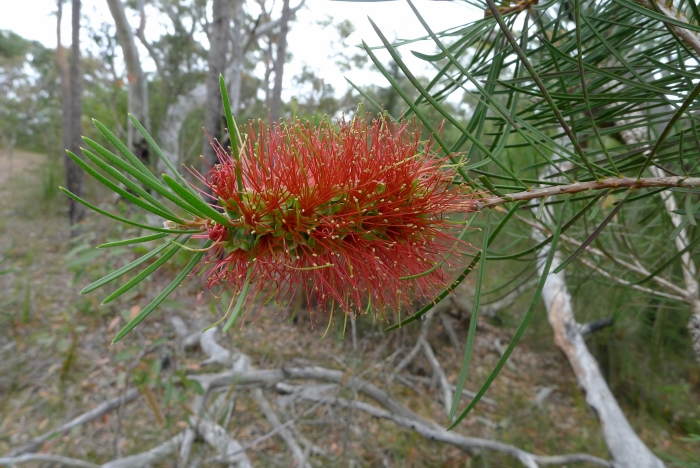Pine-Leaf Bottlebrush
(Callistemon pinifolius)
Pine-Leaf Bottlebrush (Callistemon pinifolius)
/
/

John Tann from Sydney, Australia
CC BY 2.0
Image By:
John Tann from Sydney, Australia
Recorded By:
Copyright:
CC BY 2.0
Copyright Notice:
Photo by: John Tann from Sydney, Australia | License Type: CC BY 2.0 | License URL: https://creativecommons.org/licenses/by/2.0 | Uploader: Amada44 | Publisher: Wikimedia Commons | Title: Narrow-leaved_Bottlebrush_flower_(8349172340).jpg | Notes: {{Information |Description={{en|Flower beds in park Kolomenskoye ([[Moscow]]).}} {{ru|1=Цветники в Коломенском (Москва).}} |Source= {{own}} |Date= 23.08.2009 |Author= [[User:Kor!An|Kor!An (Корзун Андрей)]] |Permission |















Estimated Native Range
Summary
Callistemon pinifolius, commonly known as Pine-Leaf Bottlebrush, is an evergreen shrub native to the open woodlands and plains of New South Wales, Australia. It typically grows to a height of 3 meters (10 ft) and features narrow, pine-like leaves with a rigid point. The plant is notable for its striking red flower spikes that appear in late spring or early summer, adding a vibrant splash of color to the landscape. These flowers are particularly showy, with the spikes occurring at the ends of branches that continue to grow after flowering, as well as on the sides of the branches. The grey, hard, fibrous bark of the Pine-Leaf Bottlebrush is another distinctive characteristic.
The Pine-Leaf Bottlebrush is valued for its hardiness and adaptability, thriving in a variety of soil conditions and preferring full sun exposure. It is drought-resistant and can handle low to medium water availability, making it suitable for xeriscaping and water-wise gardens. The plant’s resistance to pests, including the sawfly, is an added benefit. It is used in gardens for its ornamental flowers and as a low-maintenance shrub in urban landscapes, borders, and as a specimen plant. The Royal Horticultural Society has recognized it with the Award of Garden Merit, highlighting its qualities as a garden plant. While it is not commonly seen in gardens, its ease of care and pest resistance make it a valuable addition to suitable climates.CC BY-SA 4.0
The Pine-Leaf Bottlebrush is valued for its hardiness and adaptability, thriving in a variety of soil conditions and preferring full sun exposure. It is drought-resistant and can handle low to medium water availability, making it suitable for xeriscaping and water-wise gardens. The plant’s resistance to pests, including the sawfly, is an added benefit. It is used in gardens for its ornamental flowers and as a low-maintenance shrub in urban landscapes, borders, and as a specimen plant. The Royal Horticultural Society has recognized it with the Award of Garden Merit, highlighting its qualities as a garden plant. While it is not commonly seen in gardens, its ease of care and pest resistance make it a valuable addition to suitable climates.CC BY-SA 4.0
Plant Description
- Plant Type: Shrub
- Height: 5-10 feet
- Width: 2-4.5 feet
- Growth Rate: Moderate
- Flower Color: Red
- Flowering Season: Spring, Summer
- Leaf Retention: Evergreen
Growth Requirements
- Sun: Full Sun
- Water: Low, Medium
- Drainage: Medium
Common Uses
Bee Garden, Bird Garden, Butterfly Garden, Drought Tolerant, Fragrant, Hummingbird Garden, Low Maintenance, Showy Flowers
Natural Habitat
Native to the open woodlands and plains of New South Wales
Other Names
Common Names: Pine-Leaved Bottlebrush
Scientific Names: , Callistemon pinifolius, Melaleuca linearis var. acerosa, Melaleuca linearis var. pinifolia, Metrosideros pinifolia, Callistemon acerosus, Callistemon brachyandrus var. acerosus, Melaleuca linearifolia var. pinifolia,
GBIF Accepted Name: Callistemon pinifolius (J.C.Wendl.) Sweet